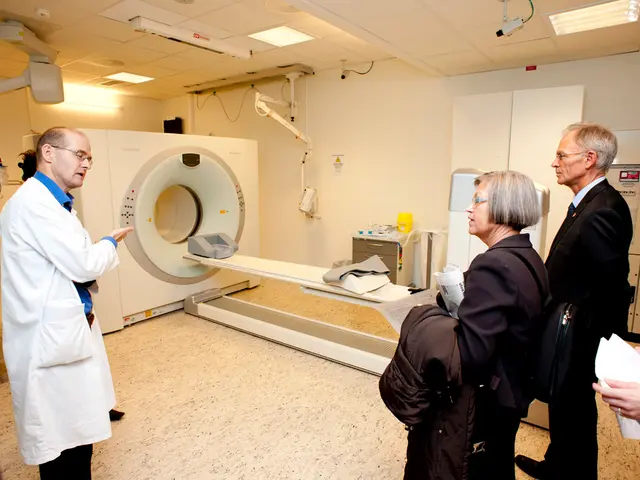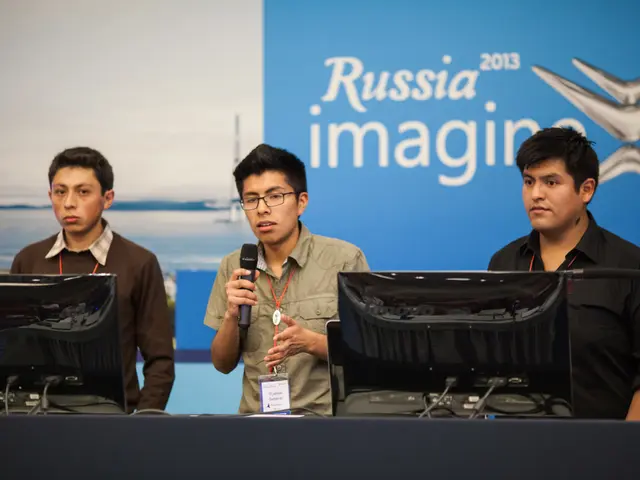Struggles persistent in Germany over endeavor to save children from Gaza confinement
In a compassionate move, several German cities have offered to take in and provide medical treatment for seriously ill or traumatized children from the Gaza Strip. Hannover, Dusseldorf, Bonn, Leipzig, and Kiel have extended their hands in a gesture of humanity, yet the German federal government remains hesitant.
The federal government's reluctance stems from concerns about the security situation, logistical feasibility, and political considerations. The Interior Ministry stresses that support depends heavily on the security conditions in Gaza, the ability to safely depart the area, and other logistical challenges.
Political and bureaucratic caution also plays a role in the government's hesitation. They prefer to assess the situation thoroughly rather than rushing into the project, and they want to motivate countries nearer Gaza to take responsibility for care. Officials, such as Deputy Foreign Minister Serap Güler, have criticized the city proposals as political maneuvers more suited to election campaigns than effective humanitarian aid, warning against "exploiting" vulnerable children for political points.
Immigration concerns are also a factor in the government's hesitation. The government appears wary of setting precedents that might complicate immigration and asylum procedures, given the broader political sensitivities around migration. They emphasize that direct support and medical aid in the region is preferable to avoid protracted immigration processes and long journeys that children would have to endure.
While the German federal government is hesitant, the mayors of the offering cities have written a letter to Interior Minister Alexander Dobrindt and Foreign Minister Johann Wadephul for help. The cities require support from the federal government to proceed with their offer, as federal authorities would handle entry procedures, selection of the children, and coordination of the relief effort.
This hesitation contrasts with other European countries like Italy, Spain, and the UK, which have moved faster to admit and treat children from Gaza. The British government has announced an evacuation operation to accept over a hundred children from Gaza, but aid organizations are urging the government in London to act quickly.
In Germany, the far-right Alternative for Germany (AfD) party is constantly pushing the government with new demands regarding immigration. However, Belit Onay, mayor of Hannover, has rejected criticism from the Foreign Ministry and pointed out that Germany has taken in injured people from Russia's war in Ukraine and abused Yazidis from Iraq in the past. Hannover Mayor Onay has suggested cooperating with the United Kingdom in taking in children from Gaza.
The German government welcomes the offer in principle, but the main focus will remain on expanding medical assistance locally and in the surrounding region. Chancellor Friedrich Merz has not yet commented on the offer made by German cities to take in children from Gaza.
As the situation in Gaza continues to deteriorate, with desperation growing as food supplies run out, the German government's hesitation has drawn criticism. Ines Schwerdtner, leader of the opposition socialist Left Party, has called Guler's statement disgraceful and unacceptable, arguing that Germany should not be idle while people die in Gaza. A spokeswoman for the Foreign Ministry later rejected Guler's statement.
Interior Minister Dobrindt has expressed caution about the measures being discussed, stating that the federal government is already helping people in Gaza and the focus should be on providing aid on the ground. A spokesperson for the Interior Ministry stated that support will depend on the security situation and the possibility of departure and other factors.
Alexander Hoffmann, leader of the CSU parliamentary group in the Bundestag, stated that medical treatment for children in Germany could lead to their relatives coming through family reunification programs. The federal government is hesitant and wants to review the situation first before making a decision.
[1] https://www.spiegel.de/politik/deutschland/gaza-fluchtinge-deutsche-staedte-bieten-hilfe-a-8b8d6297-23e0-4ddf-b10e-f37d15263f3a [2] https://www.n-tv.de/politik/Gaza-Fluechtlinge-Deutsche-Staedte-bieten-Hilfe-article21711347.html [3] https://www.tagesschau.de/ausland/gaza-fluechtlinge-101.html [4] https://www.welt.de/politik/deutschland/article219885765/Gaza-Fluechtlinge-Deutsche-Staedte-bieten-Hilfe.html
- The German federal government's reluctance to accept seriously ill or traumatized children from Gaza is due to security concerns, logistical challenges, political considerations, and immigration concerns.
- The Interior Ministry emphasizes the importance of secure conditions in Gaza, safe departure, and logistical feasibility for supporting these children.
- The mayors of several German cities, including Hannover, Dusseldorf, Bonn, Leipzig, and Kiel, have written to the Interior Minister and Foreign Minister, requesting support to proceed with their offer to take in children from Gaza.
- Other European countries such as Italy, Spain, and the UK have been quicker to admit and treat children from Gaza, while the British government has announced an evacuation operation to accept over a hundred children.
- Political parties like the socialist Left Party in Germany criticize the federal government's hesitation, arguing that Germany should not stand idle while people in Gaza die due to the deteriorating situation.
- The German government focuses on expanding medical assistance locally and in the surrounding region, with Chancellor Friedrich Merz remaining silent on the offer made by German cities to take in children from Gaza.
- Some members of the German government, like Alexander Hoffmann of the CSU, are concerned that providing medical treatment for children in Germany could lead to family reunification programs, increasing immigration.




